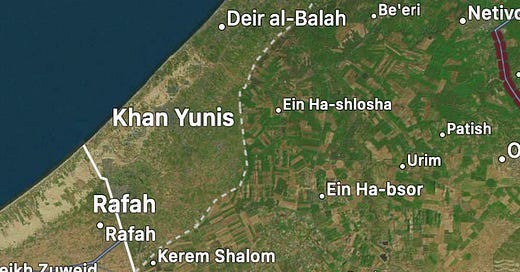Dr Seema Jilani is one of the few foreign medical helpers who has been allowed to enter the Gaza Strip by the Israeli authorities. She came from the US and spent two weeks at al-Aqsa hospital in Deir al-Balah. A paediatrician, she had hesitated at her usefulness in a war zone, expecting that the vast majority of patients would be war-wounded young men, with bullet and shrapnel wounds. Instead she found overcrowded emergency rooms with no supplies or facilities, no beds, no painkillers, no gauze dressings, in which four out of five patients were children. Al-Aqsa was where she was needed, but al-Aqsa was where there was little to nothing she could medically do.
On one of her shifts, a man was brought in still wearing his United Nations RWA identifier jacket. Both his legs had been severed. There was nothing could be done, except to wait for him to die. Seema waited with him, dabbed his lips with what water there was: saline from a Baxter bag. She stroked his hair and his eyes reacted; she wiped blood from them and they thanked her, even if he couldn’t. She spoke gentle words to him as he slipped from life into death. Instead of preserving him from it, all that was in her power to do was to ease his descent into it.
When asked on npr whether she felt she had made a difference, she comes with an emphatic yes. “It means something to the doctors there to see us in solidarity with them ... they feel forgotten. They see someone standing with them and offering support to them, not even in a material way, to say, ‘We’re here to see to your patients while you mourn the death of a friend.’ It means something, and it means something to me … no matter how little it feels.”
She’s asked, “If you’re able to go back, will you?” She replies without hesitation, “Absolutely … This is a life well lived. This is what it looks like.”
Tellingly, she recounts how, in war, they talk of the fall of cities, of Mosul, in Iraq, of Saigon, in Vietnam. In Gaza, it is the hospitals that fall, one after the other and with predictable regularity. Predictable, because they put up no defence, but simply await the crush.
From across the globe we watch the landslide as voyeuristic onlookers to grief, as Jilani eloquently phrases it. And some there are look on with glee, and celebrate this ocean of blood, and anticipate with joy the eradication of the Gazan people, without a thought for the human catastrophe that that betokens, the environmental catastrophe it brings with it, the bellicose sentiments that it arouses, and the enmity that is stirred up in Israel’s neighbours. I ask myself what I can do, how I can help to stop the pain, the destruction, the suffering. I have a blog; if I said nothing else in this blog, I can at least how say sorry I am that others must die at the cruel hands of their neighbours, and beseech the inflicters of misery to cease and desist. If it is all that I can do, then that I can at least do.
I have not the means or ability to succour physically. I can give to charities that do have these means, and that I encourage you also to do. I could join a march, I could display a flag, I can write a blog article. More, I cannot do. But it behooves me to do what I can. Until I can no longer: to raise this voice of protest.





I should make myself clear; it is not the Iranian people who are evil, and especially not the Iranian women, it despising is limited to the Iranian religious government
Please don't take this comment as an endorsement of Netanyahu - I despise him and totally disagree with killing civilians of any nationality anywhere due to war. That said, why were there no medical supplies in these hospitals? Don't tell me the Israelis stole them, I won't believe you. When Hamas attacked Israel October 7, 2023 they bloody well knew the Israelis would fight back. So, why weren't these hospitals equipped with medical supplies? In the past Hamas and other terrorists have stolen food, clothing an medical supplies from UN and charities throughout the Middle East and North Africa. Sold said supplies to equip themselves with weapons.
Some supplies may have been destroyed due to bombings, but we also know that at least one hospital was destroyed by Hamas, whether purposeful or accidental. If Iran would stop arming and financing terrorists, maybe the rest of the world could step in and help and protect the Gazan people. I would be fully in support of removing the illegal Israeli settlers from the West Bank and helping the citizens there also, if and only if, the UN shut down Iranian support and protection of Hamas, Hezbollah, and Houthis.
If any people are to blame here, Iran and the weapons manufacturing industries in the United State and elsewhere are at the top of the list.